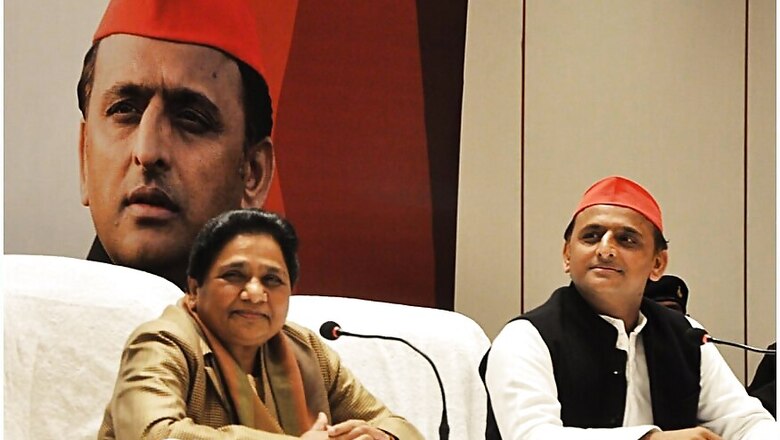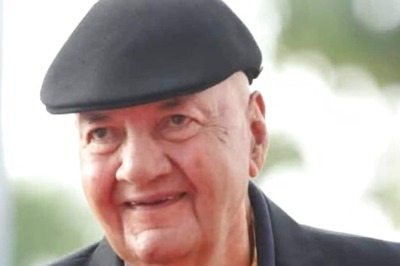
views
The SP-BSP-RLD gathbandhan, which was expected to make a dent in the NDA tally riding on support of Dalits, Muslims, Yadavs and Jats, suffered a major defeat in the Lok Sabha elections, with the Bharatiya Janata Party (BJP) scoring a resounding victory in Uttar Pradesh by fetching 60 plus seats. The feat is unprecedented for many as the BJP leaders were themselves expecting around 50 seats in the state.
The gathbandhan could manage to get only 15 seats, pointing at a complete failure of the making of electoral ‘bahujan’. The ‘bahujan’, simply meaning ‘the majority of the people, in Uttar Pradesh is the combination of Scheduled Castes, OBCs and Muslims, which constitute a big chunk of population, and the alliance was banking heavily on this caste arithmetic to pull off a win.
The results of the 2019 polls suggest that the SP-BSP cadres could not turn the joint poll campaign into an effective one, despite constant appeals from Akhilesh Yadav and Mayawati. Their local political memories of conflict and competition could not allow them to come together.
Secondly, the BSP failed to mobilise the non-Jatav Dalit vote segments such as Mushahr, Nat, Kanjar, Sarvan, etc. There are a total of 66 Scheduled Caste communities in Uttar Pradesh. Among them, only four or five Dalit castes such as Jatav, Pasi, Dhobi and Kori got political representation and voice in the politics. The BSP failed to provide space to these smaller, most marginal communities.
On the other hand, the BJP executed the mobilisation of these marginalised groups in a well-planned manner, strategically targeting dissemination of governmental policies such as Ujjawala Scheme, Pradhan Mantri Awas Yojana, Rural electrification and Mudra scheme to these groups. The BSP-led Ambedkar Gram Yojana mostly benefitted influential SC communities such as Jatavs, Pasies and the Kori-dominated habitats.
Samajwadi Party also failed to mobilise the non-Yadav, OBC and Most Backward castes. Miority groups such as Kasera, Thathera, Bharbhuja, Loniya, Panery, Tamoli, Kushwaha, Koiries and Gaderiya remained untapped by the SP and gathbandhan. They did not provide political space to these communities and also failed in facilitating political articulation of their desires and aspirations.
The failure of SP-BSP in reaching out to these communities created space for the BJP and RSS to turn tables in their favour. The BJP formed a broader social alliance of the upper castes, non-Yadav OBCs, and various communities of the Most Backward castes and non-Jatav castes to battle the gathbandhan strategy of social polarisation.
After this micro management of caste and communities was in place, the saffron party wasted to time in giving final touches to its strategy by making strong pitches around nationalism and building the issue of national security to swing polarisation in its favour.
The gathbandhan seems to have failed also in the transfer of its core vote bank. For instance, the Jatavs as the base vote of the BSP and Yadavs as the base vote of SP, had inherent conflicts with each other in some of the area of UP. This happened due to the emergence of OBC as a landholder caste and Dalits as being landless people who work on their lands. Also, the politically important and powerful Yadavs and the newly politically assertive Jatav communities have been fighting among each other since several years. Their clashes over social and economic interests also created hurdles in the transfer of votes in some constituencies.
These issues did not allow a ‘bahujan’ to be formed in Uttar Pradesh in the real sense. The SP-BSP-RLD gathbandhan became an alliance of leaders and not the cadres and base vote. The BJP got the votes of the lower middle-class which comprises mostly of Dalits and OBCs.
Apart from this, the Congress candidates and candidates of Shivpal singh Yadav-led Pragatishil Samaj Party also damaged the prospects of the gathbandhan candidates in many seats.
In fact, failure of an evolved ‘bahujan’ in electoral politics in 2019 may have a long-term impact on the future Indian politics. The politics of Mandal and Ambedkarites needs to be reinvented again in Uttar Pradesh and North India. The failure of RJD-led gathbandhan in Bihar asks for a new trajectory of social justice-based caste politics. Similarly, constant marginalisation of BSP in other Hindi states like Madhya Pradesh and Rajsthan may create a political situation to also redraw the map of Dalit politics in North India.
(The author is professor and director of GB Pant Social Science Institute, Prayagraj. Views are personal)

















Comments
0 comment